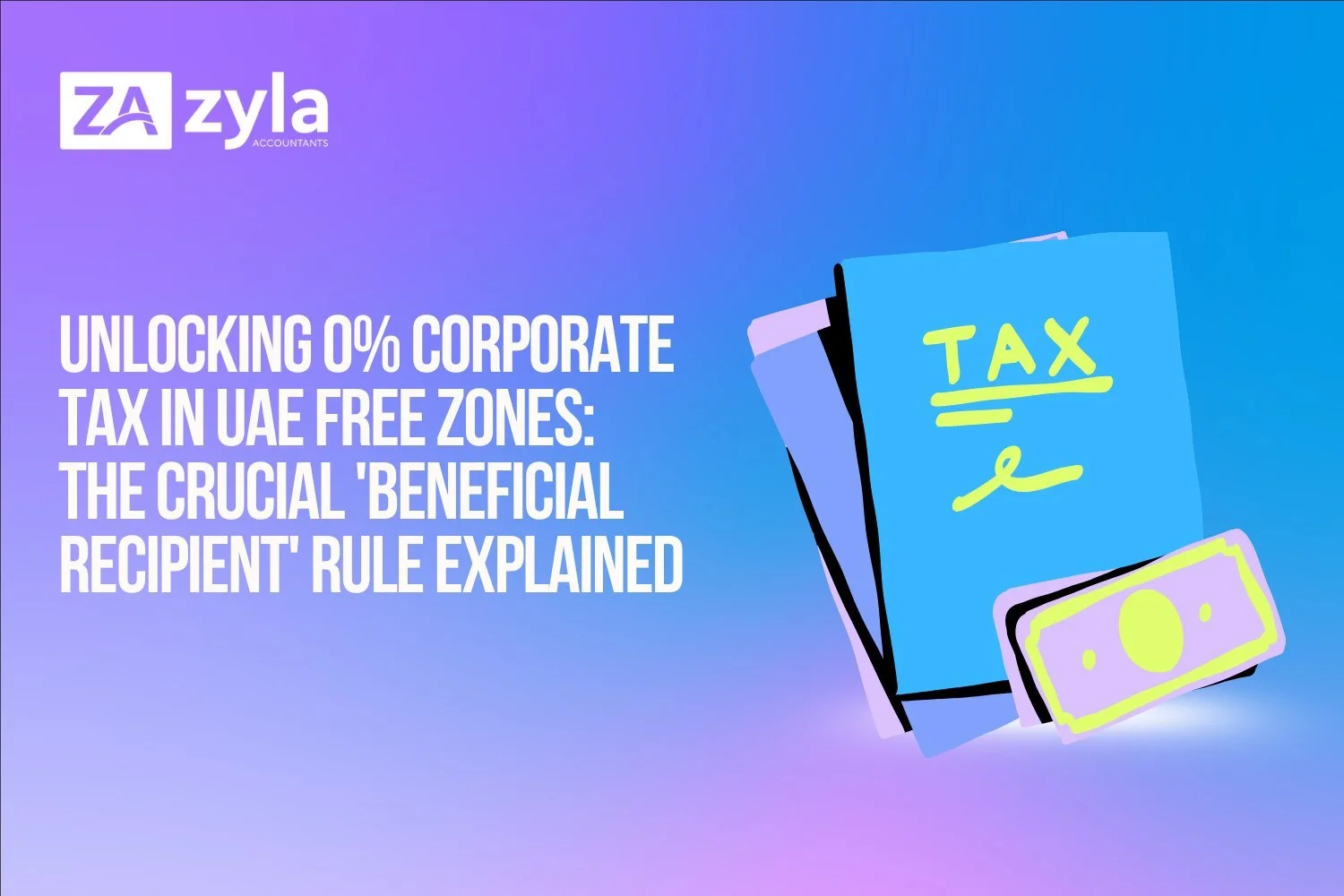Unlocking 0% Corporate Tax in UAE Free Zones: The Crucial 'Beneficial Recipient' Rule Explained
The introduction of the UAE Corporate Tax has presented a landmark opportunity for businesses operating within its thriving Free Zones: a 0% tax rate on 'Qualifying Income'.
However, this attractive incentive is not automatic. It hinges on meeting a set of stringent conditions, one of the most critical and nuanced being the ‘Beneficial Recipient’ rule.
As FTA-approved Tax Agents and Corporate Tax specialists, we at Zyla Accountants have seen this rule become a key point of discussion for our clients. Understanding it is not just about compliance; it's about fundamentally structuring your inter-company transactions to secure your 0% tax status.
So, what does it mean to be a 'Beneficial Recipient', and how does it impact your Free Zone business?
Defining the 'Beneficial Recipient'
In simple terms, the 0% tax rate can apply to transactions between two Free Zone Persons. For the supplier of the goods or services, the income from this transaction is only 'Qualifying Income' if the receiving Free Zone Person is the Beneficial Recipient.
A Free Zone Person is considered a Beneficial Recipient if they meet these three core conditions:
They have the right to use and enjoy the goods or services they have received.
They are not contractually or legally obligated to pass on those exact goods or services to another party.
The goods or services are for the entity's own use and consumption, not for one of its Domestic or Foreign Permanent Establishments.
Essentially, this rule is designed to ensure that the 0% rate benefits genuine economic activity within the Free Zones, preventing entities from acting as mere intermediaries or 'conduits' to pass benefits to non-qualifying entities. If your company is simply a middleman, an agent, or a nominee acting on behalf of another party (like a group company or a third party), then you are not the Beneficial Recipient. The true recipient is the end-user.
A Practical Example: Substance Over Form
Let's break this down with a real-world scenario.
Company A is a translation agency operating in a UAE Free Zone. This is a Qualifying Activity.
Company B is a legal consultancy, also in a Free Zone. Legal services are an Excluded Activity, so its income is generally not 'Qualifying Income'.
Company C is a mainland company that requires legal advice from Company B, but specifically in German.
Company B has the legal expertise but lacks in-house German translators. So, Company B contracts Company A to translate its legal documents and advice into German. Company B then incorporates these translations into its final legal advisory package for Company C.
Let's analyse the transaction between Company A and Company B:
Is Company B the Beneficial Recipient of Company A's translation services? Yes.
Why? Because Company B is not simply passing the translation to Company C. It is using the translation as a direct input to create its own, distinct service: German-language legal advice. Company B has transformed the service. Company C could not have simply contracted Company A to get the legal advice it needed.
The Tax Outcome:
For Company A, the income received from Company B is Qualifying Income, eligible for the 0% Corporate Tax rate (assuming all other conditions are met).
For Company B, the income it receives from the mainland Company C is non-qualifying and will be subject to the standard 9% Corporate Tax rate. This is because its activity (legal services) is an Excluded Activity being provided to a Non-Free Zone Person.
This example clearly illustrates that the rule focuses on the substance of the transaction.
Due Diligence for Free Zone Businesses
If you are a Free Zone company selling goods or services to another Free Zone entity, the onus is on you to assess whether your customer is a Beneficial Recipient.
You can, and should, obtain a written declaration or include a clause in your contract where the purchaser confirms they are the Beneficial Recipient and will use the goods/services for their own qualifying business purposes.
However, a word of caution: you cannot rely on this declaration blindly. If you have reason to believe it is inaccurate (for example, if you are contracted to deliver goods directly to a third party's premises on the mainland), you cannot treat the income as qualifying. 'Know Your Customer' principles are paramount.
The Zyla Accountants Perspective
The Beneficial Recipient rule is a cornerstone of the Free Zone Corporate Tax regime. It ensures that the 0% tax incentive is awarded to businesses with genuine operational substance within the Free Zones.
Navigating these requirements demands a clear understanding of your business model, your supply chain, and your contractual obligations. Getting it wrong can lead to unexpected tax liabilities and negate the primary advantage of operating in a Free Zone.
As your dedicated Corporate Tax advisors, we can help you analyse your transactions, strengthen your contractual language, and ensure your business structure is fully compliant and optimised for the 0% tax rate.
Don't leave your tax status to chance. Contact Zyla Accountants today for expert guidance on the UAE Corporate Tax law.

